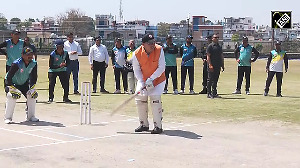Veteran Gujjar leader Aslam Choudhary, a six-time legislator, is engaged in a do-or-die contest to secure back the Congress' lost electoral turf in the mountain-locked Surankote constituency, which goes to polls in first phase on Monday.
Triangular contest in Bandipora
Claiming the backing of 38 per cent Gujjar votes in this caste-divide constituency, Aslam is facing two-time National Conference MLA and powerful Kashmiri leader Sayed Mushtaq Shah Bukhari, who is hoping for a hat-trick. The other major communities are Paharies and Kashmiris.
"I am hopeful of winning the seat again that I represented in the assembly for 30 years. It is a do or die battle for me. It is a question of pride for me," said Aslam addressing voters during the door-to-door campaigning in the Arnay-wali-gali area.
J&K 1st phase polling on Monday in terror's shadow
Aslam, who has also been two-time state Congress chief and member of Rajay Sabha, said, "Gujjars failed to vote from higher reaches during summers in view of the treat to militancy in 2002 and 1996. They were threatened not to vote and kept away. But, this time they have come down in view of winters to the Valley, it is plus point for me."
A minister in 1987 NC-Congress coalition government, he was first elected to the Assembly from undivided Mendhar-Surankote constituency, which formed one segment.
He won the seat again in 1967, 1972 and 1975. Surankote was carved out of mendhar and Aslam became first legislators to be elected from this segment in 1977. He retained the seat in 1983 and 1987.
However, he was defeated in 1996 by NC's Sayed Mushtaq Shah Bukhari with over 9,000 votes in militant-infested Urakote.
The area housed the terror camps and fortification by terrorists on Hill Kaka area were destroyed and over 80 militants killed under operation 'Sarpvinash' in January 2003.
Aslam was again defeated by a margin of 1,972 votes in 2002. Bukhari, who was a minister in Farooq Abdullah government in 1996 and won the seat in 1996 and 2002, is grandson of the powerful kashmiri leaders in Surankote-poonch, Peer Jamait Ali Shah, who won undivided Mendhar-Surankote seat in 1957 and 1962.
The family has influence among voters belonging to Pahari and Kashmiri community.
But Bukhari would have to overcome anti-incumbency factor to again trounce the Congress veteran.
"I am confident to win the seat. I have done work in constituency. I will have a hat-trick," he said, claiming that there was no anti-incumbency factor against him.
Bukhari also has other rivals including his cousin, Mumtaz Ahmed bukhari, a retired surgeon, who has jumped into fray as a PDP candidate.
With both eyeing Kashmiri-pahari voters, it could adversely affect Bukhari's chances, according to observers. While Pahari speaking people traditionally back NC candidate, the Gujjars tend to support Aslam, they said.
About 38 per cent population in Surankote segment is Gujjar mostly in areas of Hari Marhot, Pir Panjal mountains and entire belt across Suran river. About 18 per cent of voter population is kashmiri, which is spread over Bafliaz, Marha and Bushana. While nearly 20 per cent of the electorate are Muslim Rajputs, seven per cent are Pahari speaking people.
The Surankote valley stll lags behind in development with poor water and power supply, road connectivity, educational and health care system. Aslam, Bukhari and Mumtaz face eight other candidates, including Andul Aziz Bhat (BJP), Jameel Hussain (Panthar party) and Shareef Shad (BSP).
77,822 voters will decide the fate of 11 candidates in fray. 117 polling stations have been set up.







 © 2025
© 2025